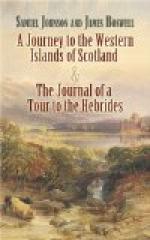The Highland weapons gave opportunity for many exertions of personal courage, and sometimes for single combats in the field; like those which occur so frequently in fabulous wars. At Falkirk, a gentleman now living, was, I suppose after the retreat of the King’s troops, engaged at a distance from the rest with an Irish dragoon. They were both skilful swordsmen, and the contest was not easily decided: the dragoon at last had the advantage, and the Highlander called for quarter; but quarter was refused him, and the fight continued till he was reduced to defend himself upon his knee. At that instant one of the Macleods came to his rescue; who, as it is said, offered quarter to the dragoon, but he thought himself obliged to reject what he had before refused, and, as battle gives little time to deliberate, was immediately killed.
Funerals were formerly solemnized by calling multitudes together, and entertaining them at great expence. This emulation of useless cost has been for some time discouraged, and at last in the Isle of Sky is almost suppressed.
Of the Earse language, as I understand nothing, I cannot say more than I have been told. It is the rude speech of a barbarous people, who had few thoughts to express, and were content, as they conceived grossly, to be grossly understood. After what has been lately talked of Highland Bards, and Highland genius, many will startle when they are told, that the Earse never was a written language; that there is not in the world an Earse manuscript a hundred years old; and that the sounds of the Highlanders were never expressed by letters, till some little books of piety were translated, and a metrical version of the Psalms was made by the Synod of Argyle. Whoever therefore now writes in this language, spells according to his own perception of the sound, and his own idea of the power of the letters. The Welsh and the Irish are cultivated tongues. The Welsh, two hundred years ago, insulted their English neighbours for the instability of their Orthography; while the Earse merely floated in the breath of the people, and could therefore receive little improvement.
When a language begins to teem with books, it is tending to refinement; as those who undertake to teach others must have undergone some labour in improving themselves, they set a proportionate value on their own thoughts, and wish to enforce them by efficacious expressions; speech becomes embodied and permanent; different modes and phrases are compared, and the best obtains an establishment. By degrees one age improves upon another. Exactness is first obtained, and afterwards elegance. But diction, merely vocal, is always in its childhood. As no man leaves his eloquence behind him, the new generations have all to learn. There may possibly be books without a polished language, but there can be no polished language without books.




